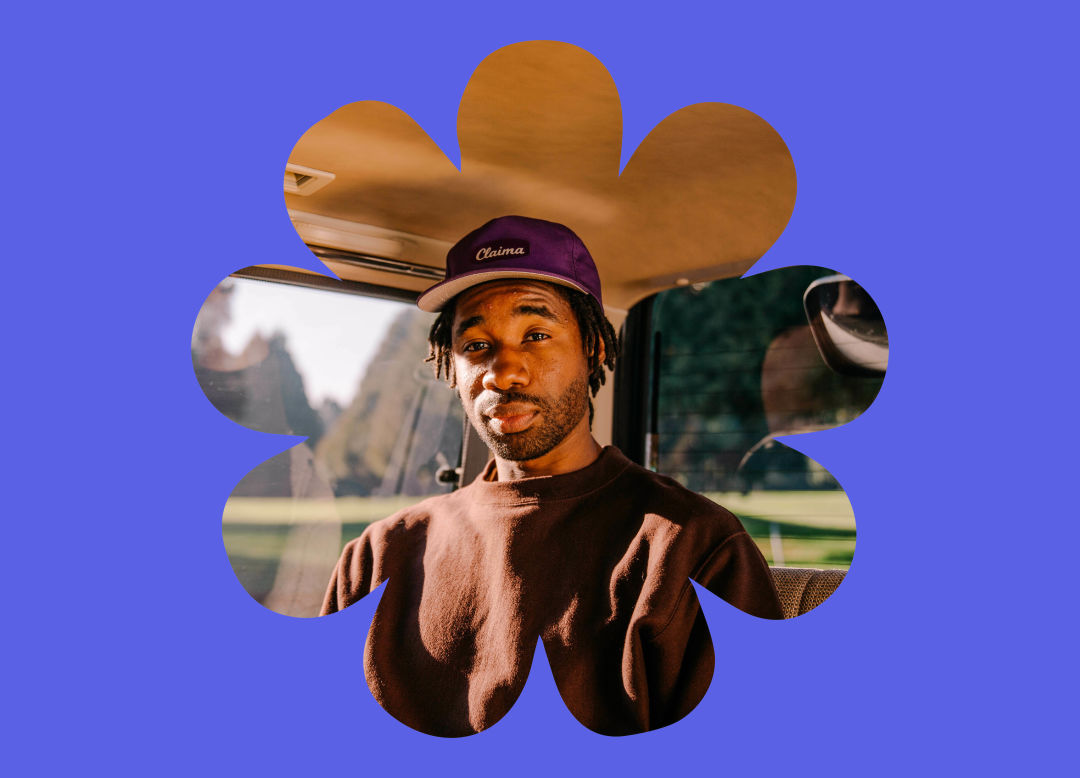Ripping the City With Bimma Williams

Welcome to Portland Monthly's "Ripping the City", a new series that highlights interesting Portlanders doing interesting things in the community, and offers their insights on the city they call home. This week: Entrepreneur/Podcaster Bimma Williams.
Bimma Williams' journey to Portland starts over 2,000 miles away, in his hometown of Baton Rouge, Louisiana. It was his passion for footwear that would land him a position at Saucony in Boston, and thereafter a role at both Adidas (2017) and Nike (2019) in Portland. "Portland, in all honesty—and no shade—was never on my radar. It wasn't a place I grew up hearing about, it wasn't a place that anyone in my family spoke about." Fueled by the racial climate, workplace microaggressions, and his reluctance to be working for someone else for the remainder of his career, Williams took the leap into entrepreneurship in 2020. Now, as the host of Claima Stories with Bimma, a podcast which chronicles stories about the careers of BIPOC creatives with thousands of listeners, Williams is not only able to connect with like-minded individuals, but also give them a platform.
We caught up with Bimma to hear about some of his favorite Portland spots, what he thinks about the future of the city, and what misconceptions he'd like to shatter.
As a creative, where's one place in the city you can go to get inspired/clear your mind and why?
For me, it honestly is Forest Park. There's a trail that I really love called Leif Erickson. And I would just go spend endless amount of time there. . . I never grew up in a city that had something like that. We didn't have that in Boston, and we definitely didn't have that in Baton Rouge, so it’s not something I grew up being accustomed to. Another place is either Concourse or Deadstock Coffee, which both have the same owner. These are places where I know I’m going to see folks that look like me, and it's not gonna feel like I'm in a place where I'm not represented.
What's your go-to restaurant to take out-of-towners?
That is the easy one for me. My go-to restaurant is Han Oak. It's tucked away in between these two buildings, and it's got this wonderful courtyard. I’ve never met restaurant owners like Peter and Sean. Their families are there, their kids are running around, they’re talking to guests, and the food is just incredible. They have these wonton dumplings that I just love, and the atmosphere is great. Three of my birthdays since I’ve been here have been at Han Oak, and the last one was so big we had to have a buyout for the night. Then not quite a restaurant, but still restaurant-like–but more on the dessert side–will be my wife's ice cream shop, Kate's Ice Cream.
What's one of the most slept on shops/businesses in Portland?
When it comes to sneakers and stuff like that, a lot of folks know this shop called Index. And Index is incredible. But what I don't feel like gets as much love as it should, is a shop around the corner from them called Unspoken. They have a lot of really dope apparel and a lot of items in there that I love. It’s owned by entrepreneurs of color, so I gotta support them. Then there’s a Japanese-owned spot downtown called Nakamuraya. I've gotten scarves and stuff from there. I like that spot a lot.
What's one misconception people have about Portland?
The biggest misconception is that Portland doesn’t have anything going on. And it's not that Portland doesn't have anything going on. It is a city, in my opinion, where creatives really thrive–because the creative mindset is very curious. So you might not really need to have signs telling you where something is, you might want to go find and curate that yourself. And that's been my experience here. I've been able to find these different creatives that are doing really dope things in the city that are now my friends. One of my friends is part owner of Jackie's, which is a really dope bar in town. Then being able to meet Ian [Williams of Deadstock Coffee], and another homie is Plant-Based Papi. When people say there's not stuff going on, I'm like, I get it, you're looking for the party. But for us, we're looking to build businesses, we're looking to create community. If you're trying to build something, if you're trying to get into a creative endeavor, this is a great city to do that because you can get access to so many people that will help you build what you're trying to build.
What excites you most about the future of the city?
I think Portland gets a bad rap for performative wokeness. Like four or five years ago, my home girl came into town. She looked at me, and she said, ‘You don't think all these Black Lives Matter signs are weird?’ And I was like, tell me more about that about what you mean. She's said, ‘Well, there's a bunch of white people that live in those homes.’ I would love to see in the next five to 10 years that it's not just [signs in windows], that the transformation is real and it's beyond just a sign in someone's yard or marketing. Portland can have a thriving community of people of color. I think that's a real thing and I think we're seeing it bubble up right now. But the real opportunity is how will the city step up to make sure those folks can continue to grow, knowing all the challenges that we run into?
Define Portland in three words.
Creative. Entrepreneurial. Growing.




